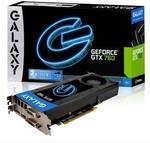Deal ends tomorrow at 12 PM, not bad, GTX 760 is abit slower than the GTX 670.
Galaxy GeForce GTX 760 2GB Video Card $279.99 + Shipping @ MWave
Related Stores
closed Comments

Yeah, I hope this means more price drops.
This is about $30 less than next cheapest on staticice (and cheaper than the cheapest HD 7950 which is pretty close, depending on the game).

Could someone explaining the numbering of graphics cards please?
I was under the impression that for example:
A Geforce GTX 660TI would be better than my 560TI and so on. How/why is a 760 a bit worse than the 670?

Because the old becomes new again. Old Gen MID range card becomes re badged new gen LOW range card and so forth with minor difference. Old gen high is typically more powerful then new gen mid range. its all marketing…

The first number is the generation, the second number is how good it is in that generation of cards, thus a 7th gen 60 card isn't as good as the previous 6th gen 70 card. The 70 cards are very good and can play most everything on max settings.

From your example:
Wouldn't the 760 at least be on par with the 670 since its the latest generation and how technological advancements have made it at least equal in terms of performance to the 670?

Nope because they don't advance THAT much in 12 months.. See current consoles for somewhat of an example. The consoles launched in what.. 2006/2007? They can still run Skyrim, Far Cry 3, etc.. maybe not quite as pretty as PC but still looks quite nice with next to no framerate issues.
One generation of GFX cards is not a massive leap, which is why I'm still happy with my GTX 560 on a new MB with 3rd gen i7 and 16GB ram.. but I am waiting out on a good deal for a 770 :)

Nvidia: GTX [Generation][important number]0 (e.g.: 670)
Radeon: HD [Generation][important number][somewhat important number]0 (e.g. 7850)…but honestly, it's not that useful. The bottom line is, you can't trust the number. You have to look at benchmarks to know how fast a card is.
Save and use these links (or remember the names and google them):
Anandtech GPU Bench:
http://www.anandtech.com/bench/product/830?vs=854and Tom's Hardware hierarchy chart:
http://www.tomshardware.com/reviews/gaming-graphics-card-rev…

anyone knows the difference between the Galaxy, MSI and the Gigabyte version?

MSI and Gigabyte have 3 year warranty with a local Aus warranty service centre. The Galaxy only has a 2 year warranty and no local service centre.
That being said if you had any problems with the Galaxy you could always just ask for your money back or replace with a brand new one rather than wait for them to send it overseas for repair.
I own a Galaxy gtx 670 and it has been one of the best videocards I have ever owned due in part to the great drivers from nvidia, but the card itself is very well built I wouldn't view galaxy as some cheap generic brand.

I think he means from a technical standpoint.
Galaxy is generally considered a budget GPU vendor along with vendors like Inno3D, Leadtek, Zotac, Palit, HIS, and Sapphire.
Higher-end vendor models (i.e. Gigabyte, MSI, ASUS) have a custom PCB entirely different from the reference design with more power supply phases, thus the ability to handle more voltage (which in turn means you can generally overclock to a higher degree), in addition to having much more durable and longer-lasting capacitors, MOSFETs, chokes, copper as well as an all-round better build quality.
A few vendors like Gigabyte have OC'ed models that have been through a sorting process to eliminate inferior chips.
Noise and heat can be greatly reduced with higer-end aftermarket coolers and HSF assemblies.
And then there's all the enthusiast bells and whistles like on-the-fly OC'ing buttons on the card, dual BIOS, instant BIOS reset, instant voltage switch, more comprehensive monitoring/benchmarking functionality, etc.
All in all, this should equate to more generous tolerances in heat, clock speeds, voltages and longer lifespans but as you should well know, computing hardware is sometimes a gamble, and someone has to get the duds.

GTX 760 is abit slower than the GTX 670.
I like how graphics card nomenclature makes it impossible for anyone not in-the-know to understand what's faster/better.


Good to see more deals on mid range gfx cards… 4gb 770 here we come!